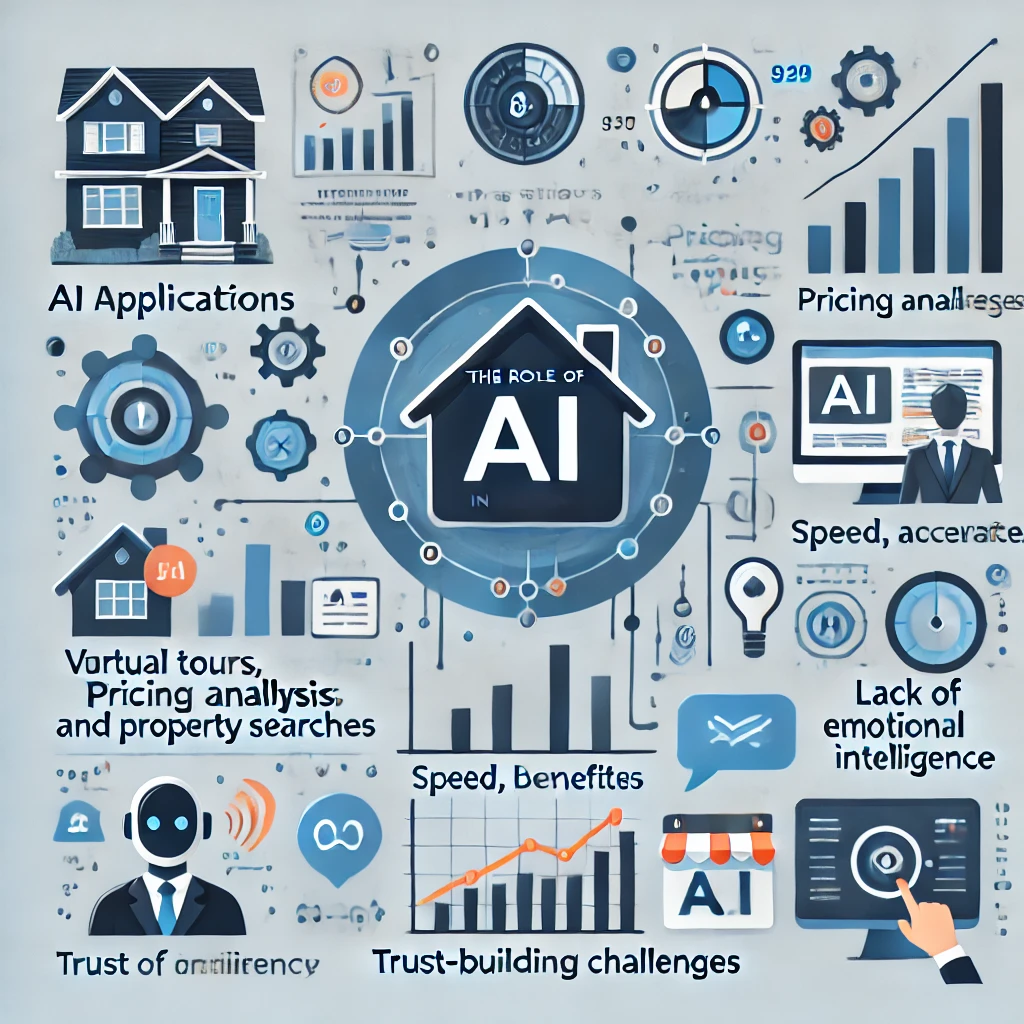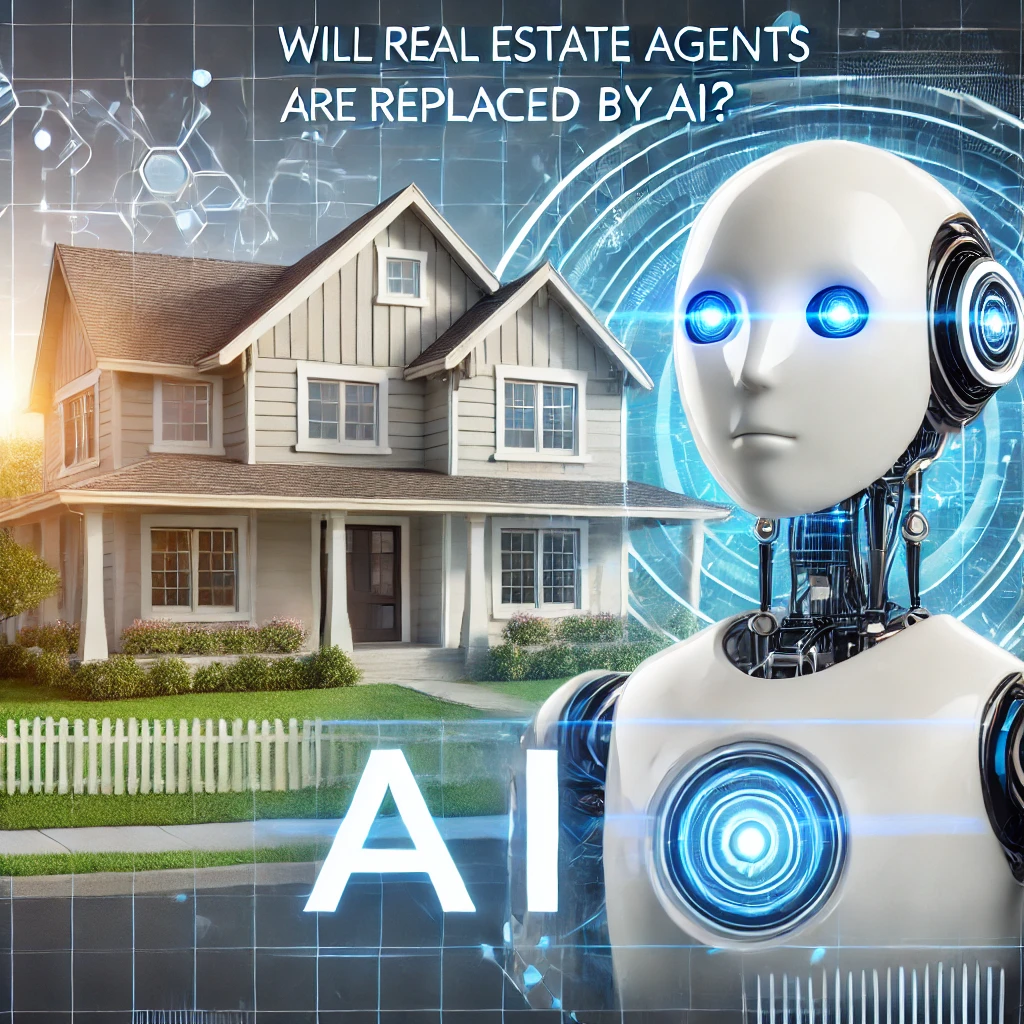- Introduction to the topic
- Current trends in real estate and AI
Understanding AI in Real Estate
- What is AI, and how does it work?
- Applications of AI in various industries
How AI is Impacting the Real Estate Industry
- Automation of property searches
- Virtual property tours powered by AI
- AI-based pricing and market analysis
Benefits of AI in Real Estate
- Faster processes
- Improved customer experience
- Reduced human errors
Limitations of AI in Real Estate
- Lack of emotional intelligence
- Inability to build relationships
- Dependence on data accuracy
The Role of Real Estate Agents Today
- Providing personalized advice
- Negotiation expertise
- Building trust and relationships
Can AI Fully Replace Real Estate Agents?
- AI as a tool versus a replacement
- Tasks AI can handle versus human skills
AI and Customer Relationships
- Why trust and empathy matter in real estate
Legal and Ethical Considerations
- Handling contracts and disputes
- Ethical dilemmas AI might face
Future Trends in Real Estate and AI
- Predictions for the next decade
- Emerging AI technologies in real estate
How Real Estate Agents Can Adapt to AI
- Embracing technology as an ally
- Upskilling to stay relevant
- Building a tech-savvy personal brand
Real-Life Examples of AI in Real Estate
- Case studies of AI-driven success
- Tools and platforms making waves
Challenges of AI Adoption in Real Estate
- Cost barriers
- Resistance to change in the industry
The Hybrid Approach: Humans and AI Together
- Combining the strengths of agents and AI
- Examples of hybrid models
Conclusion
- Summarizing key insights
- Final thoughts on the coexistence of AI and agents
FAQs
- 5 unique questions related to the topic
Will Real Estate Agents Be Replaced by AI?
The rise of artificial intelligence (AI) has sparked debates in countless industries, and real estate is no exception. With AI automating processes, analyzing vast amounts of data, and enhancing customer experiences, it’s no wonder people are asking: Will real estate agents become obsolete? Let’s dive into the topic and explore whether technology can truly replace the human touch in real estate.

Understanding AI in Real Estate
What is AI, and How Does It Work?
AI refers to the simulation of human intelligence by machines. It involves algorithms that learn, adapt, and make decisions based on data. From chatbots to predictive analytics, AI has become a cornerstone of innovation across industries.
Applications of AI in Various Industries
AI is revolutionizing healthcare, finance, e-commerce, and now, real estate. In each field, it improves efficiency, reduces costs, and offers unique insights.
How AI is Impacting the Real Estate Industry
Automation of Property Searches
AI-powered platforms like Zillow and Redfin simplify property searches by filtering results based on user preferences. These tools provide personalized recommendations with a click.
Virtual Property Tours Powered by AI
Gone are the days of scheduling multiple property visits. AI enables virtual tours, allowing potential buyers to explore homes from the comfort of their own space.
AI-Based Pricing and Market Analysis
Advanced algorithms analyze historical data, market trends, and property features to provide accurate pricing recommendations. This helps buyers and sellers make informed decisions.
Benefits of AI in Real Estate
- Faster Processes: Tasks like property matching and documentation are completed in seconds.
- Improved Customer Experience: AI chatbots offer instant support, answering queries 24/7.
- Reduced Human Errors: Automation minimizes mistakes in paperwork and data entry.
Limitations of AI in Real Estate
Lack of Emotional Intelligence
Buying or selling a home is often an emotional journey. AI lacks the empathy needed to connect with clients on a deeper level.
Inability to Build Relationships
Trust and rapport are crucial in real estate. AI might provide information, but it can’t form genuine bonds.
Dependence on Data Accuracy
AI’s effectiveness relies on accurate and up-to-date data. Inconsistent or incomplete data can lead to poor results.
The Role of Real Estate Agents Today
Providing Personalized Advice
Agents offer tailored guidance, considering factors beyond algorithms, like personal preferences and local nuances.
Negotiation Expertise
AI can crunch numbers, but it can’t negotiate deals with the finesse of a skilled agent.
Building Trust and Relationships
Agents act as confidants and advisors, earning client loyalty through trust and understanding.
Can AI Fully Replace Real Estate Agents?
While AI excels at tasks like data analysis and automation, it falls short in areas requiring human intuition, creativity, and emotional intelligence. Rather than replacing agents, AI serves as a valuable tool that enhances their capabilities.
AI and Customer Relationships
Trust, empathy, and relationship-building are irreplaceable. Clients often need a reassuring voice or a listening ear, which AI simply cannot provide.
Legal and Ethical Considerations
Handling Contracts and Disputes
Real estate transactions involve complex legalities. Agents ensure compliance, resolve disputes, and navigate ethical challenges.
Ethical Dilemmas AI Might Face
AI lacks the moral compass needed to make judgment calls in ambiguous situations.
Future Trends in Real Estate and AI
The future promises exciting advancements, from predictive analytics to blockchain integration. However, the human element will remain central to the industry’s evolution.
How Real Estate Agents Can Adapt to AI
- Embracing Technology: Use AI tools to streamline workflows.
- Upskilling: Learn to interpret AI-generated data and offer added value.
- Building a Tech-Savvy Brand: Leverage social media and digital platforms to stay competitive.
Real-Life Examples of AI in Real Estate
Platforms like Compass use AI to predict market trends, while companies like Matterport provide 3D virtual tours, transforming how properties are marketed and sold.
Challenges of AI Adoption in Real Estate
Cost, resistance to change, and the need for high-quality data are significant barriers to widespread AI adoption.
The Hybrid Approach: Humans and AI Together
The ideal solution lies in collaboration. Agents and AI can complement each other, combining human creativity with machine precision for optimal results.
Conclusion
AI is reshaping real estate, making processes faster and more efficient. However, it cannot replace the human touch, trust, and expertise that real estate agents bring to the table. The future of the industry lies in a hybrid model where technology and human skills work hand in hand.
FAQs
- Can AI help with property pricing?
Yes, AI analyzes market trends and property data to provide accurate pricing insights. - What tasks can AI handle in real estate?
AI can automate property searches, conduct virtual tours, and analyze market data. - Will real estate agents lose their jobs to AI?
Unlikely. AI is more of a tool to assist agents rather than replace them entirely. - How can agents stay relevant in an AI-driven market?
By embracing technology, upskilling, and focusing on relationship-building. - Are there any risks to relying on AI in real estate?
Yes, including data inaccuracies and the inability to address emotional or ethical aspects.
